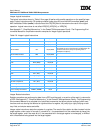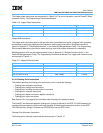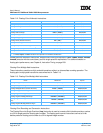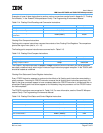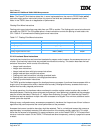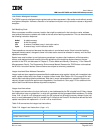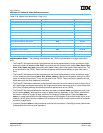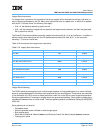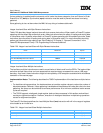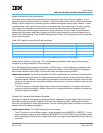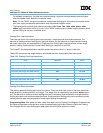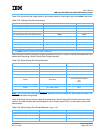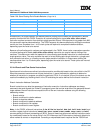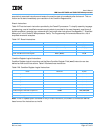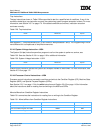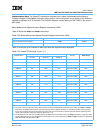
User’s Manual
IBM PowerPC 750GX and 750GL RISC Microprocessor
Programming Model
Page 102 of 377
gx_02.fm.(1.2)
March 27, 2006
If store gathering is enabled and the stores do not fall under the above categories, then an Enforce In-Order
Execution of I/O (eieio) or Synchronize (sync) instruction must be used to prevent two stores from being
gathered.
Store gathering is also not done when the MMU is busy doing a hardware table walk.
Integer Load-and-Store with Byte-Reverse Instructions
Table 2-20 describes integer load-and-store with byte-reverse instructions. When used in a PowerPC system
operating with the default big-endian byte order, these instructions have the effect of loading and storing data
in little-endian order. Likewise, when used in a PowerPC system operating with little-endian byte order, these
instructions have the effect of loading and storing data in big-endian order. For more information about big-
endian and little-endian byte ordering, see “Byte Ordering” in Chapter 3, “Operand Conventions” in the
PowerPC Microprocessor Family: The Programming Environments Manual.
Integer Load-and-Store Multiple Instructions
The load/store multiple instructions are used to move blocks of data to and from the GPRs. The load multiple
and store multiple instructions can have operands that require memory accesses that cross a 4-KB page
boundary. As a result, these instructions might be interrupted by a DSI exception associated with the address
translation of the second page.
Implementation Notes: The following describes the 750GX implementation of the load/store multiple instruc-
tion.
• For load/store string operations, the hardware does not combine register values to reduce the number of
discrete accesses. However, if store gathering is enabled and the accesses fall under the criteria for store
gathering, the stores can be combined to enhance performance. At a minimum, additional cache access
cycles are required.
• The 750GX supports misaligned, single-register load-and-store accesses in little-endian mode without
causing an alignment exception. However, execution of misaligned load/store multiple/string operations
causes an alignment exception.
The PowerPC Architecture defines the Load Multiple Word (lmw) instruction with rA in the range of registers
to be loaded as an invalid form.
Table 2-20. Integer Load-and-Store with Byte-Reverse Instructions
Name Mnemonic Syntax
Load Half Word Byte-Reverse Indexed lhbrx rD,rA,rB
Load Word Byte-Reverse Indexed lwbrx rD,rA,rB
Store Half Word Byte-Reverse Indexed sthbrx rS,rA,rB
Store Word Byte-Reverse Indexed stwbrx rS,rA,rB
Table 2-21. Integer Load-and-Store Multiple Instructions
Name Mnemonic Syntax
Load Multiple Word lmw rD,d(rA)
Store Multiple Word stmw rS,d(rA)



